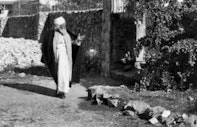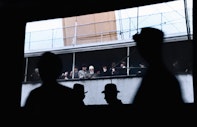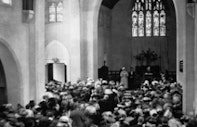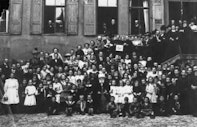What Bahá’ís Believe
Bahá’u’lláh and His Covenant
‘Abdu’l-Bahá – The Perfect Exemplar
Articles and Resources
- What Bahá’ís Believe
- Overview
- Bahá’u’lláh and His Covenant
- The Life of the Spirit
- God and His Creation
- Essential Relationships
- Universal Peace
- What Bahá’ís Do
A selection of readings, essays, and resource materials offering further exploration of the life, mission and legacy of ‘Abdu’l-Bahá.
Writings and Talks of ‘Abdu’l-Bahá
This collection includes over two hundred letters written by ‘Abdu’l-Bahá on subjects such as the life and mission of Bahá’u’lláh, guidance for individuals, education and science.
This series of fourteen letters addressed to the Bahá’ís of the United States and Canada during World War I became the charter for the growth of the Bahá’í community throughout the world.
In this book, written after Bahá’u’lláh addressed the rulers of the earth, ‘Abdu’l-Bahá presents a coherent programme for the regeneration of society, built upon universal education and the eradication of ignorance and fanaticism.
In His Will and Testament, ‘Abdu’l-Bahá described His circumstances, refined the structure of the Bahá’í administrative order, and appointed His grandson, Shoghi Effendi, as His successor. The document was written in three parts between 1901 and 1908.
A philosophical treatise written by ‘Abdu’l-Bahá in September 1921 in answer to questions put to Him by the noted Swiss psychologist, this document described the differences between the kingdoms within creation, the spiritual nature of humanity and the existence of God.
In this Tablet addressed to the Central Organization for a Durable Peace at The Hague, ‘Abdu’l-Bahá places the attainment of international peace within the context of the need for wider political, economic and cultural change. He also stated that the newly created League of Nations was too restricted to realize peace.
This collection of eulogies of over 70 early Bahá’ís was originally delivered as a series of talks to gatherings of Bahá’ís in Haifa during the early years of World War I.
An early narrative of Bábí and Bahá’í history, this text was first published anonymously in 1890 as a historical account of the birth of a religion and a defence of the Faith’s pure motives.
‘Abdu’l-Bahá’s talks in the French capital covered a wide range of themes including human nature, the soul, the Prophets of God, and racial and religious prejudice. This compilation includes His addresses in Paris as well as selected other materials.
A compilation of 139 talks and discourses given by ‘Abdu’l-Bahá during His travels in North America, which explore the fundamental principles of the Bahá’í Faith.
Other Resource Materials
Gathered below are selected historical materials, articles, and essays, which further explore the life of the ‘Abdu’l-Bahá.
These selections provide a glimpse of the relationship between Father and Son, between a Messenger of God and the one He chose to be the perfect Exemplar of His teachings.
Shoghi Effendi described ‘Abdu’l-Bahá, his Grandfather, the unerring Interpreter of Bahá’u’lláh’s Word, and the embodiment of every Bahá’í ideal. Other writings from the Guardian about the Centre of the Covenant have been gathered in this collection.
The news of ‘Abdu’l-Bahá’s passing on November 28, 1921, inspired an unprecedented event of unity among the Jewish, Christian, Muslim and Druze communities of Haifa.
In this penetrating and moving essay, George Townshend reflects upon ‘Abdu’l-Bahá’s character and the lessons and example He offered for the lives of people everyone.
In this essay, Ali M.Yazdi (1899-1978), shares some of his memories of ‘Abdu’l-Bahá.
In this historical narrative, Myron Phelps—a New York attorney—records his experience travelling to ‘Akká in the early 20th century to observe ‘Abdu’l-Bahá’s daily life and learn lessons from Him in person.
‘Abdu’l-Bahá’s first stay in Paris in 1911 was documented by Lady Blomfield, a Bahá’í from London, who penned this memoir of the four month visit. The notes taken by her daughters and their friend Beatrice Platt were later published as the book Paris Talks.
‘Abdu’l-Bahá made a lasting impression on those who met Him, as is documented in these selected excerpts.
Commentaries on the Writings of ‘Abdu’l-Bahá and Other Literature
In this essay, Amín Banání explores the body of ‘Abdu’l-Bahá’s Writings, the wisdom it offers, the form it takes, its spirit and larger significance.
In this “document of momentous and incalculable significance,” writes Hasan M. Balyuzi, there are three provisions which ‘Abdu’l-Bahá created for protection of the Cause of Bahá’u’lláh after His passing.
In the early years of the 20th century, ‘Abdu’l-Bahá’s character and activities inspired His followers in both East and West to follow His example. Many books were written of early Bahá’ís’ experiences in His presence. This overview by Kazem and Firuz Kazemzadeh reviews five contemporary accounts of the life of the Master and a full biography which had recently been released at the time of writing.
Further Reading
A list of further reading on this subject is available here.







